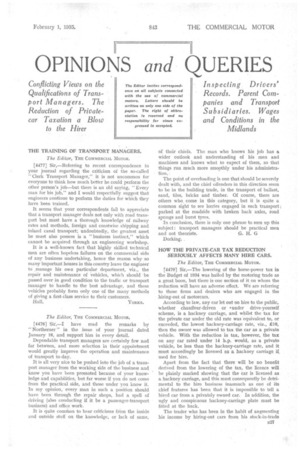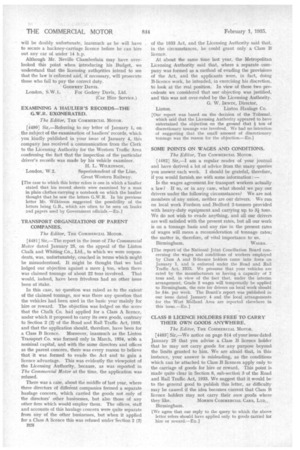OPINIONS and QUERIES
Page 37

Page 38

If you've noticed an error in this article please click here to report it so we can fix it.
THE TRAINING OF TRANSPORT MANAGERS.
The Editor, THE COMMERCIAL MOTOR.
[44771 Sir,—Referring to recent correspondence in your journal regarding the criticism of the so-called " Clerk Transport Manager," it is not uncommon for everyone to think how much better he could perform the other person's job—but there is an old saying, '' Every man for his job," and I would respectfully suggest that engineers continue to perform the duties for which they have been trained.
It seems that your correspondents fail to appreciate that a transport manager deals not only with road transport but must have a thorough knowledge of railway rates and methods, foreign and coastwise shipping and inland canal transport; undoubtedly, the greatest asset he must also possess is a "business instinct," which cannot be acquired through an engineering workshop.
It is a well-known fact that highly skilled technical men are often hopeless failures on the commercial side of any business undertaking, hence the reason why so many important houses in this country leave the engineer to manage his own particular department, viz., the repair and maintenance of vehicles, which should be passed over in good condition to the traffic or transport manager to handle to the best advantage, and these vehicles probably form only one of the many methods of giving a first-class service to their customers.
Hull. YORKS.
The Editor, THE COMMERCIAL MOTOR.
{44781 Sir,—I have read the remarks by Northerner" in the issue of your journal dated January 1 8, and support him in every detail.
Dependable transport managers are certainly few and far between, and more selection in their appointment would greatly improve the operation and maintenance of transport to-day.
It is all very nice to be pushed into the job of a transport manager from the working side of the business and know you have been promoted because of your knowledge and capabilities, but far worse if you do not come from the practical side, and those under you know it. In ray opinion, every man in such a position should have been through the repair shops, had a spell of driving (also conducting if it be a passenger-transport business) and office work.
It is quite common to hear criticisms frem the inside and outside staff on the knowledge, or lack of same, of their chiefs. The man who knows his job has a wider outlook and understanding of his men and machines and knows what to expect of them, so that things run much more smoothly under his administration.
The point of overloading is one that should be severely dealt with, and the chief offenders in this direction seem to be in the building trade, in the transport of ballast, sand, tiles, bricks and timber. Of course, there are others who come in this category, but it is quite a common sight to see lorries engaged in such transport parked at the roadside with broken back axles, road springs and burst tyres.
In conclusion, there is only one phrase to sum up this subject: transport managers should be practical men and not theorists. G. H. G Dorking. , HOW THE PRIVATE-CAR TAX REDUCTION SERIOUSLY AFFECTS MANY HIRE CARS.
The Editor, THE COMMERCIAL MOTOR.
[4479] Sir,—The lowering of the horse-power tax in the Budget of 1934 was hailed by the motoring trade as a great boon, but there is one section of it on whom the reduction will have an adverse effect. We are referring to those firms and dealers who are engaged in the hiring-out of motorcars.
According to law, any car let out on hire to the public, whether chauffeur-driven or •under drive-yourself scheme, is a hackney carriage, and whilst the tax for the private car under the old rate was equivalent to, or exceeded, the lowest hackney-carriage rate, viz., £10, then the owner was allowed to tax the car as a private vehicle. With the reduction in tax, however, the tax on any car rated under 14 h.p. would, as a private vehicle, be less than the hackney-carriage rate, and it must accordingly be licensed as a hackney carriage it used for hire.
Apart from the fact that there will be no benefit derived from the lowering of the tax, the licence will be plainly marked showing that the car is licensed as a hackney carriage, and this must consequently be detrimental to the hire business inasmuch as one of its chief features has been that it is impossible to tell a hired car from a privately owned car. In addition, the ugly and conspicuous hackney-carriage plate must be fitted at the back.
The trader who has been in the habit of augmenting his income by hiring-out cars from his stock-in-trade n27 will be doribly unfortunate, inasmuch as he will have to secure a hackney-carriage licence before he can hire out any car of under 14 h.p.
Although Mr. Neville Chamberlain may have overlooked this point when introducing his Budget, we understand that the licensing authorities intend to see that the law is enforced afid; if necessary, will prosecute those who fail to pay the correct duty.
' GODFREY 'DAVIS.
London, For Goctrey Davis, Ltd.
(Car Hire Service.) EXAMINING A HAULIER'S RECORDS—THE G.W.R. EXONERATED.
The Editor, THE COMMERCIAL MOTOR, [4480] Sir,—Referring to my letter of January 1, on the subject of the examination of hauliers' records, which you kindly published in your issue of January 4, this company has received a communication from the Clerk to the Licensing Authority for the Western Traffic Area confirming the fact that the inspection of the particular driver's records was made by his vehicle examiner.
H. L. WilaciNsoN,
London, W.2. Superintendent of the Line, Great Western Railway. [The case to which this letter refers is one in which a haulier stated that his record sheets were examined by a man in plain clothea.earrying a notebook on which the haulier thought that he saw the letters G.W.R. In his previous letter Mr. Wilkinson suggested the possibility of the letters being G.R., which are often to be seen on books :Ind papers used by Government officials.—ED.1
TRANSPORT ORGANIZATIONS OF PARENT COMPANIES.
The Editor, THE COMMERCIAL MOTOR.
[4481] Sir,—The report in the issue of The Commercial Motor dated January 25, on the appeal of the Linton Chalk and Whiting Co., Ltd., to which we were respondents, was, unfortunately, couched in terms which might be misunderstood. It might be thought that we haft lodged our objection against a mere ton, when there was claimed tonnage of about 22 tons involved. That would, indeed, have been frivolous had no other issue been at stake.
In this case, no question was raised as to the extent of the claimed tonnage, nor was there any question that the vehicles had been used in the basic year mainly for hire or reward. The objection was lodged on the score that the Chalk Co. had applied for a Class A licence, under which it proposed to carry its own goods, contrary to Section 2 (2) of the Road and Rail Traffic Act, 1933, and that the application should, therefore, have been for a Class B licence. Moreover, inasmuch as the Linton Transport Co. was formed only in March, 1934, with a nominal capital, and with the same directors and offices as the parent concern, there was every reason to believe that it was formed to evade the Act and to gain a licence advantage. This was evidently the viewpoint of the Licensing Authority, because, as was reported in The Commercial Motor at the time, the application was refused.
There was a case, about the middle of last year. where three directors of difletlent companies formed a separate haulage concern, which, carried the goods not only of the directors' other businesses, but also those of any other firm which would employ them. The offices, staff and accounts of this haulage concern were quite separate from any of the other businesses, but when it applied for a Class A licence this was refused under Section 2 (2)
B2S of the 1933 Act, and the Licensing Authority said that, in the circumstances, he could grant only a Class B licence.
At about the same time last year, the Metropolitan Licensing Authority said that, where a separate company was formed as a method of evading the provisions of the Act, and the applicants were, in fact, doing B-licence work, he intended, in exercising his discretion, to look at the real position. In view of these two precedents we considered that our objectiop was justified, and this was not over-ruled by the Licensing Authority.
G. W. IRWIN, Director, Linton. Linton Haulage Co. Our report was based on the decision of the Tribunal, which said that the Licensing Authority appeared to have entertained the objection on the ground that r ton of discretionary tonnage was involved. We had no intention of suggesting that the small amount of discretionary tonnage was the reason for the ohjection.—En.]
SOME POINTS ON WAGES AND CONDITIONS. The Editor, THE COMMERCIAL MOTOR.
[4482] Sir,—I am a regular reader of your journal and have derived a lot of advice from the many queries you answer each week. I should be grateful, therefore, if you would furnish me with some information:— Is the wages agreement for transport workers actually a law? If so, or in any case, what should we pay our drivers under the following circumstances? We are not members of any union, neither are our drivers. We run on local work Fordson and Bedford 2-tonners provided with heavy-duty equipment and carrying up to 31 tons. We do not wish to evade anything, and all our drivers are well satisfied with the present rates, but all our work is on a tonnage basis and any rise in the present rates of wages will mean a reconsideration of tonnage rates;
the matter is, therefore, of vital importance to us. .
Birmingham. WAGES.
[Thereport of the National Joint Conciliation Board concerning the wages and conditions of workers employed by Class A and B-licence holders came into force on January 1, and is enforced under the Road and Rail Traffic Act; 1923. We presume that your vehicles are rated by the manufacturers as having a capacity of 2 tons and, in view of the fact that, under the interim arrangement. Grade 2 wages will temporarily be applied to Birmingham, the rate for drivers on local work should be 54s. per week. The Board's report was published in our issue dated January. 4 and the local arrangements for the West Midland Area are reported elsewhere in this issue.—ED.]
CLASS B LICENCE HOLDERS FREE TO CARRY THEIR OWN GOODS ANYWHERE.
The Editor, THE COMMERCIAL MOTOR.
[4483] Sir,—We notice on page 814 of your issue dated January 25 that you advise a Class B licence holder that he may not carry goods for any purpose beyond the limits granted to him. We are afraid that, in this instance, your answer is misleading, as the conditions which can be attached to Class B licences apply only to the carriage of goods for hire or reward. This point is made quite clear in Section 8, sub-section 3 of the Road and Rail Traffic Act, 1933. We suggest that it would be to the general good to publish this letter, as difficulty may be caused if the idea becomes current that Class B licence holders may. not carry their own goods where
they like. MORRIS COMMERCIAL CARS LID Birmingham.
[We agree that our reply to the query to which the above letter refers should have applied only to goods carried for hire or reward.—ED.1




















































































